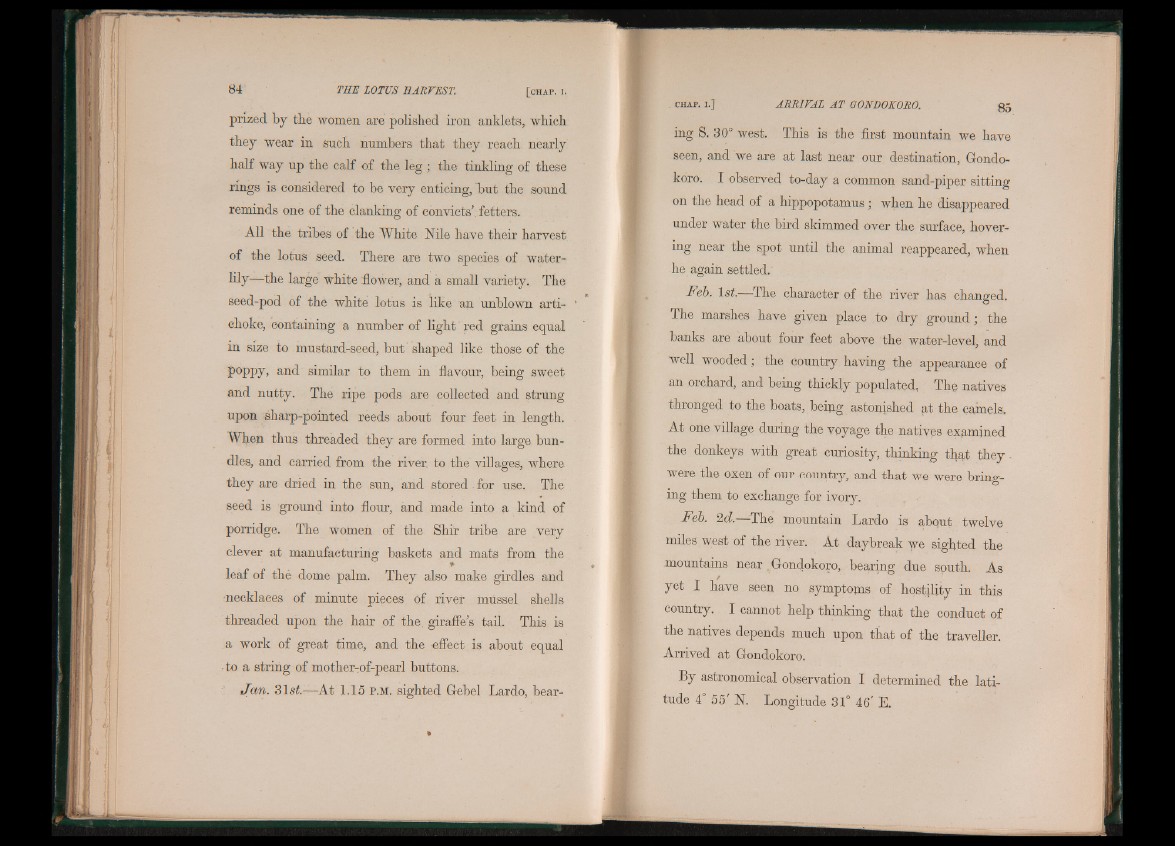
p r i z e d b y t h e w o m e n a r e p o l i s h e d i r o n a n k l e t s , w h i c h
t h e y w e a r i n s u c h n u m b e r s t h a t t h e y r e a c h n e a r l y
h a l f W a y u p t h e c a l f o f t h e l e g ; t h e t i n k l i n g o f t h e s e
r in g s i s c o n s i d e r e d t o b e v e r y e n t i c i n g , b u t t h e s o u n d
r e m i n d s o n e o f t h e c l a n k i n g o f c o n v i c t s ’, f e t t e r s .
All the tribes of the White Nile have their harvest
of the lotus seed. There are two species of water-
lily—the large white flower, and a small variety. The
seed-pod of the white lotus is like an unblown artichoke,
containing a number of light red grains equal
in size to mustard-seed, but shaped like those of the
poppy, and similar to them in flavour, being sweet
and nutty. The ripe pods are collected and strung
upon sharp-pointed reeds about four feet in length.
When thus threaded they are formed into large bundles,
and carried from the river, to the villages, where
they are dried in the sun, and stored I for use. The
seed is ground into flour, and made into a kind of
porridge. The women of the Shir tribe are very
clever at manufacturing baskets an*d mats from the
leaf of thé dome palm. They also make girdles and
-necklaces of minute pieces of river mussel shells
threaded upon the hair of the. giraffe’s tail. This is
a work of great time, and the effect is about equal
to a string of mother-of-pearl buttons.
Jan. 31s#.—At 1.15 p .m . sighted Gebel Lardo, bearing
S. 30° west. This is the first mountain we have
seen, and we are at last near our destination, Gondo-
koro. I observed to-day a common sand-piper sitting
on the head of a hippopotamus ; when he disappeared
under water the bird skimmed over the surface, hovering
near the spot until the animal reappeared, when
he again settled.
F 2b. Is#.—The character of the river has changed.
The marshes have given place to dry ground; the
banks are about four feet above the water-level, and
well wooded ; the country having the appearance of
an orchard, and being thickly populated, The natives
thronged to the boats, being astonished at the camels.
At one village during the voyage the natives examined
the donkeys with great curiosity, thinking that they
were the oxen of our country, and that we were bringing
them to exchange for ivory.
Feb. 2d. The mountain Lardo is abqut twelve
miles west of the riyer. At daybreak we sighted the
mountains n e a r. Gonclokoro, bearing due south. As
yet I have seen no symptoms of hostility in this
country. I cannot help thinking that the conduct of
the natives depends much upon that of the traveller.
Arrived at Gondokoro.
By astronomical observation I determined the latitude
4° 55' N. Longitude 31° 46' E.